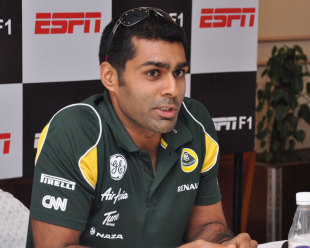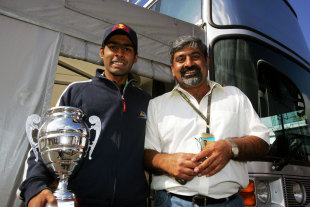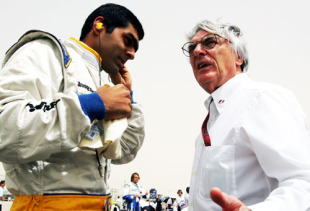- Karun Chandhok Q&A
Racing's spice boy
Karun Chandhok has come a long way from being a wide-eyed kid marvelling at F2 and F5000 cars racing around disused airfields in Chennai, India. But even though he's now the country's unofficial Formula one ambassador, he's a firm believer that racing drivers have to burst out of the bubble of the F1 paddock

It's quite difficult for people in Europe to appreciate just how tricky it must have been for a boy from India to make his way in motor racing. Can you explain how you got started?
In India I started off in a small single-seater championship called Formula Maruti, which was a little 800cc single seater car, basically a big go-kart with gears. That was all we had at the time as an organised national championship. Today it's a bit different; we have a few different series that kids can do but back then Maruti was what you had to race in. After that I moved on to racing in the Formula 2000 Asia series in 2001 and that was my first international experience. We raced in the Philippines, at three different circuits in Malaysia, and in Thailand and China. I was 17 when I did that. It was quite a good championship and it was quite an interesting year.
When you were racing in India what circuits did you race on?
There was just one, in Chennai, the Irungattukottai Circuit. There was a short circuit and a long circuit version and that was it. The whole championship was on that one track. It was a decent enough field, though, of maybe about 20 drivers.
Was the Formula Maruti championship you raced in a provincial series?
No. You have to understand that the Madras circuit was opened in 1989, and only in 2003 did we get a second circuit, which is in Coimbatore, which is where Narain [Karthikeyan] is from. But they are both cities in the same state, Tamil Nadu, the southernmost state of India. So, from '89 until 2003, Chennai was the only track in India. It's only now that we have something in the north, in Delhi. Anyone who wanted to race, in the whole of India, had to come down south.
What was the constituency like for motor racing when you were growing up? Did you feel like a bit of an outsider among your peers for being interested in it?
Not really. In the championship we had grids of about 20 cars, so those were the people you shared your passion for motorsport with. And today we have two grades of formula category and two saloon car categories and they've all got grids of 20 cars or more. For me, growing up, there was never any feeling of being the odd one out because my dad was involved in motorsport, as was my grandfather. I didn't care about anything else. A lot of my family and my family's friends from the UK were involved in motorsport. My father had a lot of friends who were in the business. I had plenty of people to talk motorsport with.
Did you feel that you were directed towards motorsport by your family's involvement? Or was it something you had a passion for from a young age?
My family never forced us to do anything we didn't want to do. We're quite liberal that way. My brother has absolutely no interest in F1 or motorsport at all. He's a club level cricketer and he also runs his own PR company. My interest in motorsport obviously comes from the family and obviously they were a huge influence on me but the decision to go racing was purely mine.
What kind of cars did your grandfather race?
He raced only in India, as did my father. I don't think either of them ever raced internationally. My grandfather raced back in the 1950s and they did a lot of rallying at the time. I think my grandfather used to race Jaguar E-Types and things like that. My dad raced single seaters and rallied a lot too. He used to race Formula 2 cars. He had an ex-Elio De Angelis Chevron, he also had a Ralt RT4 Formula Atlantic car. He did a lot of rallying too. He did the Himalayan Rally a number of times and won it in, I think, 1986.

What does your grandfather make of your own career?
He did come to see me racing in GP2 once and I think it was all a bit confusing for him! He came to Dubai to watch an Asia Series race [in 2008] and I think it was quite an eye opener for him, just to see the level we were racing at and to see the level the teams operate at. He was quite surprised by it all. He was one of the founders of motorsport in India. He founded the ASN there, the federation that runs motorsport in India, of which my father is currently the president and Vijay [Mallya] the chairman. My grandfather was the one who went out an acquired the land to build the Madras circuit in the 1980s. He played a huge role in the development of motorsport in India in its infant stages.
How was motor racing perceived in India in the time your father and grandfather were racing? Was it viewed as the preserve of the very rich?
I don't know about my granddad's era but in my dad's time I remember going to races as a three- or four-year-old - I've seen the pictures -and it was completely mad. There would be 70,000 people there to watch them race. There were massive crowds, absolutely huge. In those days they used to just race on disused airfields in Chennai and Delhi, Bombay, Bangalore, Calcutta and Sri Lanka even.
But then, when we moved to a permanent circuit in Chennai in 1989 and a more professional type of racing, with regulated categories and a proper international standard track that ran Formula 3 races, the crowds just disappeared. Today, you couldn't even get 7,000 people to come to a race in Chennai. It's unbelievable and very hard to understand. I think, back in the day, the classes were more open. People would come and see all these fantastically exotic cars. The Maharaja of Gondal, a real maharaja, would bring along his Formula 5000 car; he had a Surtees. I think it felt maybe a bit more special, but at the same time more accessible. Also you have to remember that nothing like this was on TV at the time. Going to the races was a great form of entertainment for people. I think it's perhaps one reason why the crowds disappeared, as it was around the same time that we started getting satellite TV in India.
Let's go back to your early racing years. You went to Europe and competed in F3 and Formula Renault 3.5 but how did your GP2 drive come about?
I had no money at all. At the end of 2006 I was ready to quit racing. I had no money to put anything together, no money to go back to Europe. I was finished. I had a job offer to be the team manager of the Raikkonen Robertson Formula 3 team. I accepted it and I was ready to go and work at a desk job.
But then Bernie called my dad and he said to him: "get Karun on a plane and go to Jerez for a test with the Campos team in GP2". So I got on the plane. I did a day's testing and it seemed to go OK and that was it. This was in November. I didn't hear anything from Bernie all the way through December and January. At that point it wasn't looking great. I had told them at Raikkonen Robertson that if I hadn't heard anything from a GP2 team by the 1st of February I would take the job as team manager. It had gone as far as looking into work permits and things like that. Then, on the 27th of January, Bernie rang me and said: "Call this number, Red Bull India want to sponsor you, call them and introduce yourself. I've done a deal with Durango for you, get on a plane to Italy and go for your seat fitting." That was it. Bernie did the contract, everything. He was fantastic. Without Bernie and Red Bull… I'm very thankful to Red Bull. They sponsored me in 2007 and 2008. They gave me my first Formula One test in 2007 and I've done some simulator work with them. I'm very grateful to them as without them I wouldn't have been able to do GP2.
You were one of the lucky ones. It must be very tough to not get that life-changing call and to have to take a job you don't necessarily want.
Definitely. It wasn't the path I wanted to be on. I wanted to race cars. Reality is harsh, though. I'm very black and white in the way I think about these things. This is reality. If you can't deal with that aspect of the sport then you shouldn't be here. If the curry's too hot for you, then don't pick up a spoon.

So, once you'd been granted that opportunity in GP2, how important was it for you to maximise it?
Extremely important. It came down to the simple fact of having to do a good job in order to keep the faith of the people supporting me. It is the big shop window too. You know that you're really close to F1 and having good support from good people at the time, I knew that if I had a good crack at GP2 then I had a realistic chance of getting into Formula One. Nothing's guaranteed, but that's what you have to aim for. I won races, I had a few podiums and a lot of top five finishes. And I learned an awful lot. I think you learn more in GP2 than you do in most other formulae. The cars are very, very similar to F1 in terms of the level of downforce and the level of grip from the tyres and the aero. You race on the same circuits, on the same weekends, in front of the same people. It's a fantastic championship.
Did GP2 give you the momentum to sustain your career in Formula One?
Yes, very much so. I think you only have to look at what GP2 has done for a huge number of drivers. You look at the F1 grid today and around 50 per cent of them came from GP2. And even beyond that: when a seven-time F1 champion gets into a GP2 car to get warmed up for his F1 comeback then that proves the worth of the cars and the series. Look at the 2008 season, when I was there. You had me, Bruno Senna, Sébastien Buemi, Lucas Di Grassi, Romain Grosjean, Jerome D'Ambrosio, Kamui Kobayashi and Vitaly Petrov. There were a lot of us in '08 who made the step to F1. It's a great championship. It was bloody hard though. I mean, really hard! If you can win races there you can win races in anything.
There is, I would say, another aspect to you that's kept you in F1 and that's a sense of a bigger picture, an awareness that there's a wider world out there. Would you say that's a fair assessment?
It's so easy to get sucked into a bubble, especially in F1. We are very privileged to be in this sport, extremely privileged to do what we do but it's not reality. There is a much bigger world out there with much bigger problems and people who are far less fortunate than we are. In the grand scheme of things Formula One is not the most important thing in the world. We're entertainers. We're not brain surgeons, we're not out there saving the planet or anything. We're just entertainers and too many people inside the sport forget that.
That lack of perspective may be a bad thing, but if you're a prospective world champion, do you need to have the kind of ego that makes you believe you are the bright centre of the universe?
Possibly…. No, actually, I don't think so. Look at people like Fernando [Alonso] and Sebastian [Vettel] and Jenson [Button] and Mark [Webber]; they are all guys who are top class racing drivers, two of them double world champions, but they all have an awareness that there is a much bigger world out there. Fernando does a lot for charity and Sebastian is a great world champion. He has a real perspective on the whole of the sport and he views it not only in terms of what might benefit him or Red Bull. That is quite unselfish and quite rare and that makes him a very worthy world champion.
Is it important for you to have that perspective, to not take this all too seriously?
I think it's important for everyone. I think it's important to be a balanced human being. When I go to India I don't talk about motorsport with any of my friends. I refuse to, because you have to talk to people about real things, about their lives and their problems. They're in tougher jobs than this. If you don't talk to people and get an idea of how people live outside this bubble then you end up as one of those 'me, me, me' people and that's just… a word you can't possibly print!
Via www.teamlotus.co.uk - Team Lotus Notes are published before every grand prix weekend

